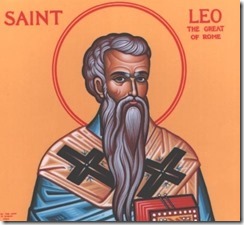 Leo the Great (c. 391 or 400 – 10 November 461)
Leo the Great (c. 391 or 400 – 10 November 461)
As therefore there is no believer, dearly-beloved, to whom the gifts of grace are denied, so there is no one who is not a debtor in the matter of Christian discipline; because, although the severity of the mystic Law is done away, yet the benefits of its voluntary observance have increased, as the evangelist John says, “Because the Law was given through Moses, but grace and truth came through Jesus Christ.” For all things that, according to the Law, went before, whether in the circumcision of the flesh, or in the multitude of victims, or in the keeping of the Sabbath, testified of Christ, and foretold the grace of Christ. And He is “the end of the Law,” not by annulling, but by fulfilling its meanings. For although He is at once the Author of the old and of the new, yet He changed the symbolic rites connected with the promises, because He accomplished the promises and put an end to the announcement by the coming of the Announced. But in the matter of moral precepts, no decrees of the earlier Testament are rejected, but many of them are amplified by the Gospel teaching: so that the things which give salvation are more perfect and clearer than those which promise a Savior. [Sermon LXIII.5]
We must not then pass over in the case of any one that which is laid down in the general ordinances: nor is that advancement to be reckoned lawful which has been made contrary to the precepts of GOD’S law. [Letter XII.2]
Men must not be allowed to lie hid who do not believe that the law given through Moses, in which GOD is shown to be the Creator of the Universe, ought to be received: [Sermon IX.4]
The teaching of the Law, dearly beloved, imparts great authority to the precepts of the Gospel, seeing that certain things are transferred from the old ordinances to the new, and by the very devotions of the Church it is shown that the LORD Jesus Christ “came not to destroy but to fulfill the Law.” For since the cessation of the signs by which our Savior’s coming was announced, and the abolition of the types in the presence of the Very Truth, those things which our religion instituted, whether for the regulation of customs or for the simple worship of GOD, continue with us in the same form in which they were at the beginning, and what was in harmony with both Testaments has been modified by no change. [Sermon XVII.1]
For Moses and Elias, that is the Law and the Prophets, appeared talking with the LORD; that in the presence of those five men might most truly be fulfilled what was said: “In two or three witnesses stands every word.” What more stable, what more steadfast than this word, in the proclamation of which the trumpet of the Old and of the New Testament joins, and the documentary evidence of the ancient witnesses combine with the teaching of the Gospel? For the pages of both covenants corroborate each other, and He Whom under the veil of mysteries the types that went before had promised, is displayed clearly and conspicuously by the splendor of the present glory. Because, as says the blessed John, “the law was given through Moses: but grace and truth came through Jesus Christ,” in Whom is fulfilled both the promise of prophetic figures and the purpose of the legal ordinances: for He both teaches the truth of prophecy by His presence, and renders the commands possible through grace. [Sermon LI.4]
Leave a Reply
You must be logged in to post a comment.